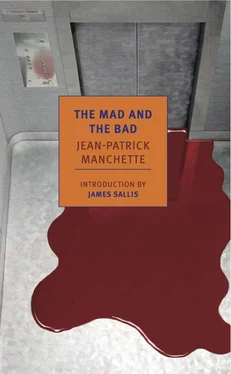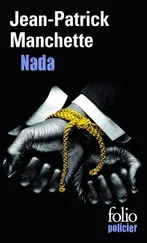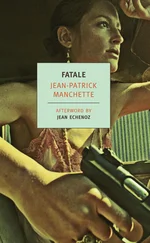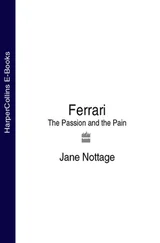Jean-Patrick Manchette - The Mad and the Bad
Здесь есть возможность читать онлайн «Jean-Patrick Manchette - The Mad and the Bad» весь текст электронной книги совершенно бесплатно (целиком полную версию без сокращений). В некоторых случаях можно слушать аудио, скачать через торрент в формате fb2 и присутствует краткое содержание. Год выпуска: 2014, ISBN: 2014, Издательство: New York Review Books, Жанр: Криминальный детектив, на английском языке. Описание произведения, (предисловие) а так же отзывы посетителей доступны на портале библиотеки ЛибКат.
- Название:The Mad and the Bad
- Автор:
- Издательство:New York Review Books
- Жанр:
- Год:2014
- ISBN:9781590177402
- Рейтинг книги:4 / 5. Голосов: 1
-
Избранное:Добавить в избранное
- Отзывы:
-
Ваша оценка:
- 80
- 1
- 2
- 3
- 4
- 5
The Mad and the Bad: краткое содержание, описание и аннотация
Предлагаем к чтению аннотацию, описание, краткое содержание или предисловие (зависит от того, что написал сам автор книги «The Mad and the Bad»). Если вы не нашли необходимую информацию о книге — напишите в комментариях, мы постараемся отыскать её.
The Mad and the Bad — читать онлайн бесплатно полную книгу (весь текст) целиком
Ниже представлен текст книги, разбитый по страницам. Система сохранения места последней прочитанной страницы, позволяет с удобством читать онлайн бесплатно книгу «The Mad and the Bad», без необходимости каждый раз заново искать на чём Вы остановились. Поставьте закладку, и сможете в любой момент перейти на страницу, на которой закончили чтение.
Интервал:
Закладка:
. . The driver was tapping Julie on the shoulder.
“Are you all right?”
The girl cast a stunned glance at the tree-lined square where the bus was parked.
“I fell asleep,” she said in a daze.
“Last stop. Five francs fifty.”
Julie paid. They got off, she and Peter. They walked away, left the square, spotted a deserted café, and took a table outside. Julie ordered a large café crème and a large hot chocolate. The place had no croissants.
“Wait here a minute,” said Julie to Peter.
There was a bakery nearby and a tobacconist almost next door to it. The girl soon returned to their table with croissants, cigarettes, and newspapers. As Peter ate, Julie frantically lit a Gauloise and began paging through the papers. She still merited a small headline but the accompanying story was brief. Clearly the journalists had no fresh information. There should be a headline such as THE NET TIGHTENS, but, of course, thought Julie, when it really is tightening, they don’t say so. Her lip tensed slightly. The back of her neck hurt.
The newspaper people embroidered a good deal on Hartog: “young financier,” they wrote, and “meteoric rise,” and “not a few envious rivals.”
“At present it is impossible to reach the industrialist,” Julie read. “According to some sources, M. Hartog, who returned hastily from Munich upon learning of the disappearance of his nephew, has left Paris once more so as to avoid publicity as the search goes on.”
“It’s obvious,” murmured Julie. “He has to be at his Moorish Tower.”
She felt more confident now, more sure of her plan. She could not be very far from Hartog’s fabulous house, his mountain labyrinth. She would get there. Throw herself at his feet. She could see the scene now, and she was excited. A scene worthy of Delacroix. The rich man would help her to her feet, understand her, forgive her, congratulate her, and seat her at his right hand on a cloud-wreathed mountaintop overlooking the Massif Central-far from the world of men, as the saying went. The girl stood and pulled Peter up, then turned back to pay for the breakfast. She was trembling. She asked the way to the station. She came to a grade crossing with a view of the platforms, bordered by dusty privet in cement planters. BOEN, said a kind of sign above the platform, blue letters against a white background-a hollow, boxlike sign supposed to light up at night like the signs outside police stations. The name BOEN meant nothing to Julie. She turned back. Peter trotted along beside her, finishing off a croissant. He observed his surroundings with curiosity; he was calm. They went into some shops, and Julie bought a rather hideous gray raincoat that came down to her knees and some Michelin maps. As they came out of the bookstore, she noticed an immense white poster on the other side of the street bearing a text in scarlet letters:
LAW AND ORDER
CAN WE LIVE WITHOUT POLICE?
WITHOUT GENDARMES?
THE BATTLE OF THAT GREAT DAY
OF GOD ALMIGHTY (REV. 16:14)
WHICH MEANS THE DISSOLUTION
OF VALUES?
IN THE LAST DAYS PERILOUS TIMES
SHALL COME (2 TIM. 3:1)
PAUL ZWICKAU
With her Michelin maps under her arm, holding on to Peter with the opposite hand, Julie crossed the street and went through a doorway just beneath the poster. In a little anteroom with a tiled floor country people wearing hats were talking in hushed tones. Beyond them was a conference hall. A sparse audience was seated on benches. Old people and children were in the majority. A guy on a stage was talking in front of a trompe l’oeil rendering of red-and-gold curtains. As Julie went to sit down, the guy gestured towards the wings.
“Paul Zwickau!” he announced in a high-pitched voice.
A young man came running from the wings. He wore a black suit and a tan polo-neck shirt. He had glasses and a part in his hair.
“Would you like to live,” he cried, “under a system that freed humanity from crime, violence, injustice, and poverty?”
The audience did not seem opposed. Zwickau began striding up and down the stage. He frequently tossed his head back in a violent manner. It was not hard to fear for his neck.
“Law and order reign in the Universe!” he exclaimed. “When we contemplate the vault of the heavens, so much is obvious. Even though the deepest meaning of the movements of the heavenly bodies may escape us, we must respect the views of the greatest scholars, astronomers, and nuclear physicists, who tell us how, night after night, season after season, year after year, and century after century the stars hew fast to their course in space and follow their orbits in so regular a fashion that it is possible to predict eclipses centuries in advance!”
The orator cleared his throat.
“My brothers, my sisters, listen! Our Eternal God has established a harmonious order in the Universe. Do you really believe that He is incapable of imposing that order and harmony on our planet, on this wretched little lump of dirt whirling through interstitial space?”
“I have seen His name!” shouted a fat woman in black.
Zwickau ignored the interruption.
“What do we see?” he cried.
“I have seen His name!” said the fat woman again.
A muscular steward grabbed her arm and whispered something in her ear. She immediately took on a guilty air.
“What do we see?” Zwickau insisted with a derisive smile. “Has man himself been able to institute law and order, an end to violence, injustice, and poverty? No! Would you like to know what happens in a big city when there are no more police? That is what occurred in Montreal on October 7, 1969. The police were on strike. Did citizens respect the law once they knew the police were no longer there to make arrests? Not at all! Right away Montreal became the scene of rioting, arson, looting, and fighting among taxi drivers. The rioters armed themselves with clubs and rocks and engaged in an orgy of senseless destruction. They smashed the windows of the Queen Elizabeth Hotel and stole merchandise. They vandalized the fine IBM Building. They plundered the Windsor and Mount Royal hotels. Without police, respect for law and order completely vanished. According to government spokesmen, the city was ‘on the verge of anarchy’!”
Zwickau stood for a moment on tiptoe, arm raised, to underscore the horror of it all.
“What do these events mean?” he went on. “Why this riotousness? And above all, what is to be done about it? Man has striven mightily and in all sincerity. He has tried every kind of regime. But he has never turned towards his Creator! His Creator who knows man’s problems better than anyone, because He has been observing everything that happens since the beginning of time.”
“Yes!” cried many voices.
“Hallelujah!”
“Hallelujah! Schmallelujah!” cried Julie.
“Be quiet, my sister,” said the muscular steward.
“I’m not your sister,” retorted Julie. But she was quiet.
“He is the Creator!” Zwickau continued. “It is our God who will bring order here below by instituting the state that we need. It is written that ‘the God of heaven shall set up a kingdom, which shall never be destroyed; and the kingdom shall not be left to other people, but it shall break in pieces and consume all those kingdoms, and it shall stand for ever.’ Daniel two, forty-four.”
Julie stood up.
“Pig! Disgusting pig!” she shouted.
Zwickau leapt down from the stage.
“Listen to me!”
Julie grabbed Peter and hoisted him onto her shoulders. The preacher pursued them out into the street. The girl raced towards the station. Zwickau gave up the chase. Julie was in the station. She had to get rid of all these bastards who were out to destroy her. This was no time to lose her head. She would have loved to open fire with a machine gun and create a bloodbath.
Читать дальшеИнтервал:
Закладка:
Похожие книги на «The Mad and the Bad»
Представляем Вашему вниманию похожие книги на «The Mad and the Bad» списком для выбора. Мы отобрали схожую по названию и смыслу литературу в надежде предоставить читателям больше вариантов отыскать новые, интересные, ещё непрочитанные произведения.
Обсуждение, отзывы о книге «The Mad and the Bad» и просто собственные мнения читателей. Оставьте ваши комментарии, напишите, что Вы думаете о произведении, его смысле или главных героях. Укажите что конкретно понравилось, а что нет, и почему Вы так считаете.












